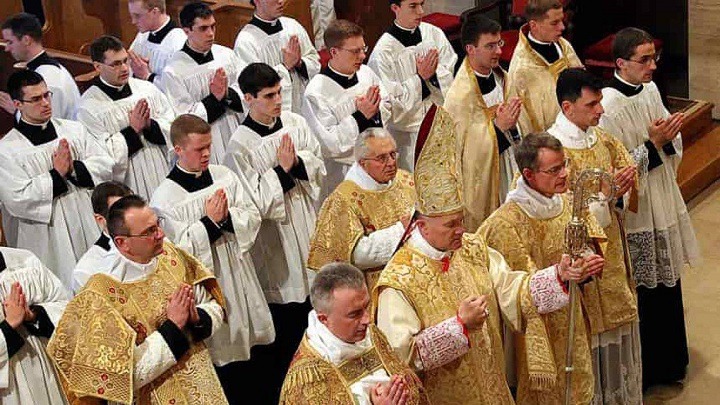The priestly fraternity of St. Pius X (Lefebvrians) is now also on the margins of the world of Catholic traditionalists. His brief response to the apostolic letter of Pope Francis, Desire you wishedand to the previous motu proprio Traditionis custodes, however, should be noted. And archived.
Dated 5 July, the note only mentions three themes.
The first is the relationship of the liturgy with theology: “the new rite is the expression of the new theology of the council. This point is easy to admit, but it is the very heart of the matter. The pope still affirms – again in the same issue (31) – that he is surprised that “a Catholic can presume” not to recognize the validity of the council.
If it is a question of saying that the Second Vatican Council has been legitimately convened, there is no problem, but if it is a question of admitting – as Paul VI stated in a letter addressed to Msgr. Marcel Lefebvre on 29 June 1975 – that this council “is no less authoritative and is even in some respects more important than that of Nicaea”, is impossible. How can a “pastoral” council, which has rejected any infallible teaching and taught novelties incompatible with tradition, have such a claim? Here is the question ».
The council or sect
Here is the n. 31 of the papal letter: “If the liturgy is” the summit towards which the action of the Church is directed and, at the same time, the source from which all its energy emanates “(SC 10), we understand well what is at stake in the question liturgical. It would be trivial to read the tensions, unfortunately present around the celebration, as a simple divergence between different sensitivities towards a ritual form. The problem is above all ecclesiological.
I do not see how we can say that we recognize the validity of the council – even if I am a little surprised that a Catholic can presume not to do so – and not accept the liturgical form born from the Sacrosanctum conciliumwhich expresses the reality of the liturgy in intimate connection with the vision of the Church admirably described in Lumen gentium. For this – as I explained in the letter sent to all the bishops – I felt the duty to affirm that “the liturgical books promulgated by the Holy Pontiffs Paul VI and John Paul II, in conformity with the decrees of the Second Vatican Council, are the only expression of the lex orandi of the Roman Rite “(motu proprio Traditiones custodes, art. 1) “.
The second point raised by the Lefebvrians concerns the active participation of the faithful. By invoking the distinction between “active power” (doing) and “passive power” (welcoming), they identify the only activity of the faithful in passive assistance to the priest. The age of the language and the stereotypical nature of the gestures allow the priest to open the mystery to the faithful.
At no. 25 of Desire you wished the pope refers to the “smoky expression” sense of mystery “”, speaking rather of “amazement”. “It is not a kind of bewilderment in the face of a dark reality or an enigmatic rite, but it is, on the contrary, the wonder that God’s saving plan was revealed to us at the Passover of Jesus (Eph 1: 3- 14) whose efficacy continues to reach us in the celebration of the “mysteries” or in the sacraments. It remains true that the fullness of revelation has, with respect to our human finitude, an excess that transcends us and that will have its fulfillment at the end of time when the Lord returns ”.
Ten thousand faithful without a priest are nothing
Third note of the Lefebvrians: the absolute centrality of the priest. Only he has “the active power” to introduce the mystery. “Ten thousand faithful without the priest are nothing in the liturgical order, apart from the case of marriage. But only one priest celebrates with the whole Church ».
The pope’s text, which greatly develops the formative orientation to the liturgy, always places the priest within the assembly, albeit with its specificity. The celebrating assembly is the place where one “learns” the meaning of celebrating and experiences the presence of Christ.
«The priest lives his typical participation in the celebration by virtue of the gift received in the sacrament of orders: this typicality is expressed precisely in the presidency. Like all the offices he is called to carry out, it is not primarily a task assigned by the community, but rather the consequence of the outpouring of the Holy Spirit received in the ordination that enables him to do this. Even the presbyter is formed by his him to preside over the assembly that he celebrates “(n. 56).
For the Lefebvrians, the papal letter “sounds like an acknowledgment of the failure which must seem very bitter as the traditional mass occupies more and more space and has become essential, which exasperates the reigning pope, as he complained in the homily of the mass on 29 June. : “Please, let us not fall into the return to the back, into this retreat of the Church which is fashionable today” ».
The pope defines his expectations as follows: “I would like the beauty of celebrating Christian, and its necessary consequences in the life of the Church, not to be marred by a superficial and reductive understanding of its value or, even worse, by its exploitation in service of some ideological vision, whatever it is. The priestly prayer of Jesus at the Last Supper so that they may all be one (Jn 17:21) judges our every division around the broken bread, sacrament of piety, sign of unity, bond of charity “(n. 16).
Liturgy: the (predictable) response of the Lefebvrians – WeekNews


